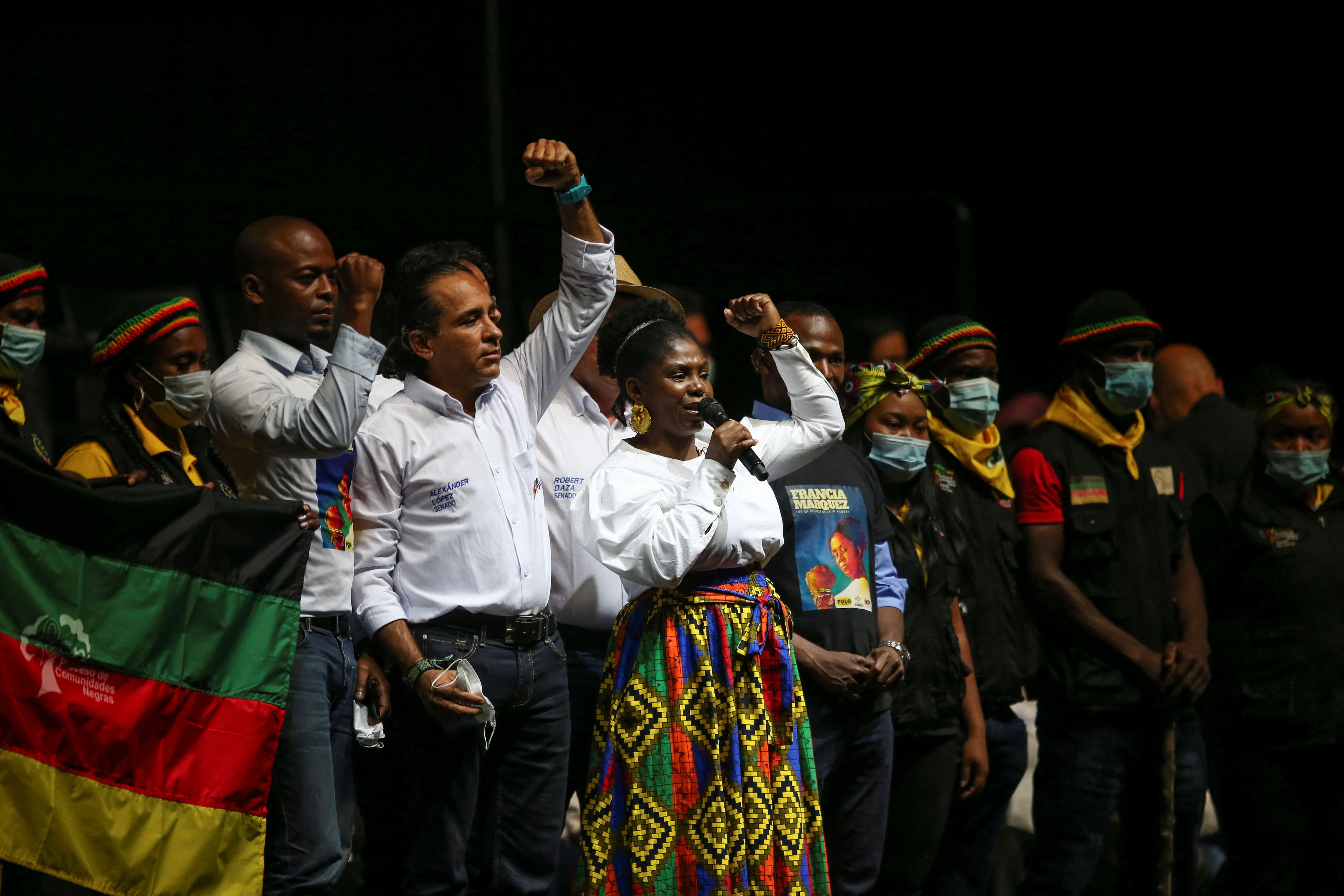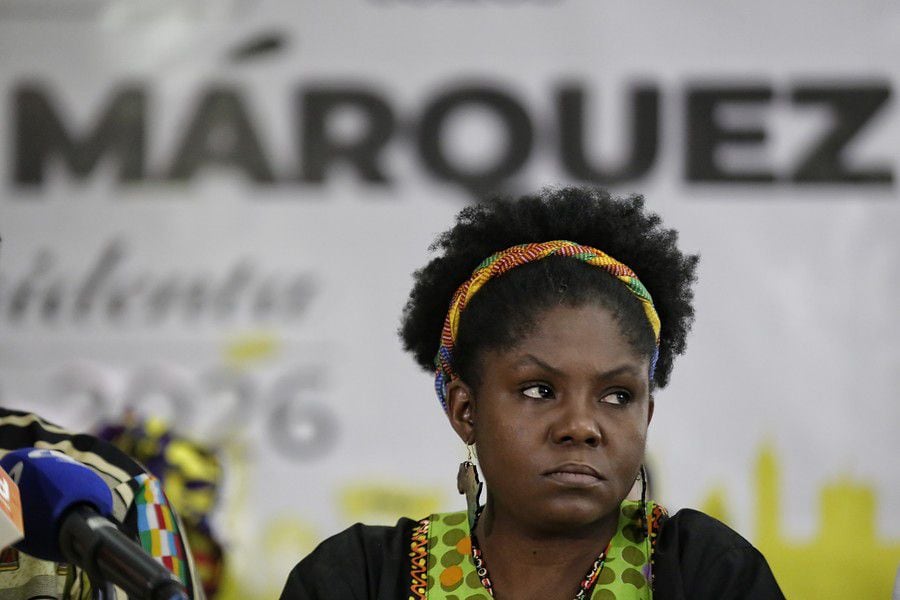
After winning nearly 800,000 votes in the internal consultation of the Historic Pact coalition, France Elena Márquez Mina consolidated herself as one of the most important figures of the democratic left in Colombia, a position that has been endorsed this Wednesday, following the official formalization of her name as candidate for the vice-presidency of Colombia by the most powerful left-wing bloc in the country.
Born in the Yolombó district, in the district of La Toma, in Suárez, a small Caucan municipality, traditionally hit by armed violence, Márquez stood out from a very young age for the defense of the environment, leading a movement against mining, both that executed illegally and that executed by large multinationals.
In 2010, he won a guardianship that prevented the displacement of his community, affected by the mining permits that had been granted to companies such as Anglogold Ashanti.
Her constant activism earned her recognition, in 2018, with the Goldman Environmental Prize in 2018, one of the most important awards awarded in the world to environmental defenders, in which she was described as “a formidable leader of the Afro-Colombian community”.
“She put constant pressure on the Colombian government and led a 10-day, 560-kilometer march of 80 women to the nation's capital, which resulted in the elimination of all miners and illegal equipment from her community,” the jury recalled, about the then young law student.
“When I speak, I speak for a place of justice, not only for blacks, but also for indigenous people, women,” Marquez herself said in her video presentation.
She began her professional preparation by graduating as an agricultural technician from the National Learning Service (SENA) and later became a lawyer from the Santiago de Cali University. “I thought I didn't have to study, but I had to do it to have the tools with which I can now help my people,” he said on that occasion.
In 2014, she led the Mobilization of Black Women for the Care of Life and Ancestral Territories, in order to denounce the negative effects that mining was having on her territory.
“Parenting in my community is based on values such as solidarity, respect and honesty. We are taught that dignity is priceless, that resisting is not enduring,” said the activist who created a new political movement called 'I am because we are', highlighting the union of many communities that have been silenced by different armed, political and social actors.
Infobae: You are seen as a representative of ethnic minorities, women and the farthest regions of the country. How have you taken up this challenge of representing these communities?
Francia Márquez: First of all, I don't belong to any minority, we are not a minority. What we are is a majority that has been excluded. In fact, that word “minorities” is still imposed by colonialism to say that blacks and indigenous people were minors; so I do not accept that they say that we are minorities. Minorities are the 47 families that have ruled in this country; but we, the excluded, the impoverished and racialized, the violated who have never been guaranteed their rights, are the majority in this country.
This campaign has been an opportunity to dialogue and create social fabric with people, youth and women, to also understand how representative politics works and to face different situations such as violence and exclusion that we have experienced in politics.
Infobae: What has been the greatest difficulty you have faced in representing these invisible populations in Colombia?
F.M.: Let's keep in mind that I am not aspiring to represent only one population group; I am here to represent the country, so my bet on this aspiration is for a country. However, I believe that we are facing situations of permanent violence. It was painful for me to see images of towns like Guapi -Cauca-, where armed actors infiltrated the population.
People feel that they live in a ghost town and that violence that is experienced in the territories is the same violence that we experience as social leaders all the time. This is the biggest obstacle for me: permanent violence, which is expressed in different ways, especially physically and in territories such as those where I have always worked, defending and caring for life. On the other hand, there is also verbal and psychological violence, and these are also difficult to compensate.

Every day I receive messages from boys and girls telling me 'We are proud of you, thank you for standing up for us and for participating. ' I received the message from an 11-year-old girl from La Guajira, she told me that her mother is involved in politics but that this year she thought she wasn't going to get involved, but since she saw me she got back into politics, she also told me 'I know I can't vote, but I'm involved and I just want you to make sure there's not so much violence in our country; that we boys and girls do not have to suffer and that we can go out in the streets calmly, without fear. '
I think that hegemonic politics is not going to be easy, it will have to be renewed and, well, I have seen several candidates talk about the things we propose. They already talk about economies for life, about ecological justice, about legalization of drugs when before they were focused on anti-drug policy. I hear them talking and I say 'Wow, they are using the same proposals that we are saying' and you can see that in the debates, what they were proposing before and what they are proposing now with our presence on the political scene. That is already a gain, that everyone is assuming the needs of real change in this country.

Infobae: Your proposal is based on a recognition of unity. How can this unity be enhanced in a country as fragmented as Colombia in its political positions, its regional visions and its social difficulties?
I think young people are doing it. This is another generation of young people who are not going to put up with those hegemonic policies that have not allowed them to live in dignity, and for me to see so many of them accompanying us to different parts, engaged and even crying, saying 'thank you for what you are doing' is an exercise in collective construction, of the I am because we are, of Ubuntu.
You know that before, women were the ones who participated the least in politics, and when we did, we did not support each other; but if today I have a support, in this country, that is that of women, and that means that our consciousness changed in terms of political representation. Where I am going I have not received contempt from women; on the other hand, they all say to me 'France, we are women and we are going with you'. You didn't see that before: one aspired to a position and many said they were with the candidate and that one had no capacity.
People want proposals and change, and in the case of us, we invite the people to build collectively, so different sectors have already sent us their proposals through documents saying what they want to do if they become president; for example, women's collectives have already built their feminist mandates, young people are also in that process of building. They have also made proposals focused on sexual and gender diversity, and the same has also been done by peasants, indigenous people and people of African descent.
Being a mother head of the family has given me the courage to face the situations that I have had to live in this country, yes? If I have faced the politics of death and extractivism in this country, it has always been thinking about my children. If I have faced telling armed actors in the midst of the conflict not to destroy our homes, it is thinking of them. If in my community I have told armed groups not to plant coca in our territories, knowing the risk that entails, we have done so with my children and our families in mind. If, in the midst of the armed conflict, we have generated peace actions, it was thinking of them and the children of all the mothers of this country, especially those who are heads of household.
So my path of social leadership and the strong defense of human rights and taking care of life has even been an inspiration that has given me the fact that I have faced the process of motherhood alone and having to push my children forward. That has given me courage, love and courage to say 'yes we can'. What allows me to say today that I want to be president of this country is to see my people immersed in pain, in suffering; to see children dying without hope because their lives don't matter.
I recently started watching the news and everything that is happening in Ukraine, and they talked more than 40 minutes about it, so I said 'Well, what happened to the people here? ' That is, Guapi, Timbiqui and the Caucan coast are confined by armed actors threatening the population; they murdered a man who went out on a boat when they told him he was forbidden to do so, but that's not what they talk about in this country. We have violence just around the corner, but we don't talk about that, and those injustices have put me here, in politics. Change is not made by those at the top, but we build it from below, through the people making the change.
Infobae: As an activist and social leader, who has shared the risks of the hundreds of leaders killed since the signing of the Teatro Colón agreement, how would you ensure that their rights are maintained and they can exercise their leadership without the risk of death or displacement?
F.M.: Firstly, guaranteeing the rights of leaders depends on the fulfillment of their rights in general. Why does a community leader raise his voice? Because this State does not guarantee him his rights, nor participation in the decision-making that will affect him. I believe that it is a matter of establishing a plan that seeks guarantees of fundamental rights and decision-making, which is in the Constitution. If we guarantee to stop the armed conflict, that will lessen the risk of social leaders in this country.
Keep reading:
Últimas Noticias
Debanhi Escobar: they secured the motel where she was found lifeless in a cistern

The oldest person in the world died at the age of 119

Macabre find in CDMX: they left a body bagged and tied in a taxi
The eagles of America will face Manchester City in a duel of legends. Here are the details

Why is it good to bring dogs out to know the world when they are puppies




